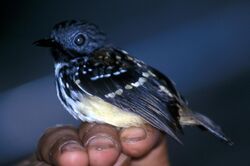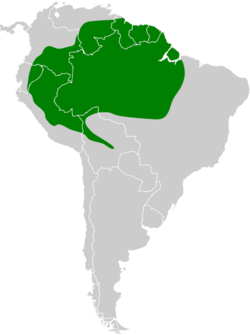Biology:Spot-backed antbird
| Spot-backed antbird | |
|---|---|

| |
| Scientific classification | |
| Domain: | Eukaryota |
| Kingdom: | Animalia |
| Phylum: | Chordata |
| Class: | Aves |
| Order: | Passeriformes |
| Family: | Thamnophilidae |
| Genus: | Hylophylax |
| Species: | H. naevius
|
| Binomial name | |
| Hylophylax naevius (Gmelin, JF, 1789)
| |

| |
| Synonyms | |
|
Hylophylax naevia | |
The spot-backed antbird (Hylophylax naevius) is a species of bird in the family Thamnophilidae, the antbirds. It is found in Bolivia, Brazil , Colombia, Ecuador, French Guiana, Guyana, Peru, Suriname, and Venezuela. Its natural habitats are subtropical or tropical moist lowland forests and subtropical or tropical swamps.
Taxonomy
The spot-backed antbird was formally described in 1789 by the German naturalist Johann Friedrich Gmelin in his revised and expanded edition of Carl Linnaeus's Systema Naturae. He placed it with the manakins in the genus Pipra and coined the binomial name Pipra naevia.[2][3] Gmelin based his description on the Fourmillier tacheté, de Cayenne that had been depicted in a hand-coloured engraving by François-Nicolas Martinet that was published to accompany Comte de Buffon's Histoire Naturelle des Oiseaux.[4] The specific epithet is from Latin naevius meaning "spotted".[5] The spot-backed antbird is now placed with two other species in the genus Hylophylax that was introduced in 1909 by the American ornithologist Robert Ridgway.[6][7]
Five subspecies are recognised:[7]
- H. n. theresae (des Murs, 1856) – southeast Ecuador, northeast Peru and west Amazonian Brazil
- H. n. peruvianus Carriker, 1932 – central north Peru
- H. n. inexpectatus Carriker, 1932 – southeast Peru, southwest Brazil (Acre) and northwest Bolivia
- H. n. naevius (Gmelin, JF, 1789) – southeast Colombia and northeast Ecuador to the Guianas, north Peru and north Brazil
- H. n. ochraceus (Berlepsch, 1912) – central south, southeast Amazonian Brazil
References
- ↑ BirdLife International (2016). "Hylophylax naevius". IUCN Red List of Threatened Species 2016: e.T22701914A93854535. doi:10.2305/IUCN.UK.2016-3.RLTS.T22701914A93854535.en. https://www.iucnredlist.org/species/22701914/93854535. Retrieved 13 November 2021.
- ↑ Gmelin, Johann Friedrich (1789) (in Latin). Systema naturae per regna tria naturae : secundum classes, ordines, genera, species, cum characteribus, differentiis, synonymis, locis. 1, Part 2 (13th ed.). Lipsiae [Leipzig]: Georg. Emanuel. Beer. p. 1003. https://www.biodiversitylibrary.org/page/2656498.
- ↑ Peters, James Lee, ed (1951). Check-List of Birds of the World. 7. Cambridge, Massachusetts: Museum of Comparative Zoology. p. 251. https://www.biodiversitylibrary.org/page/14480588.
- ↑ Buffon, Georges-Louis Leclerc de; Martinet, François-Nicolas; Daubenton, Edme-Louis; Daubenton, Louis-Jean-Marie (1765–1783). "Fourmillier tacheté, de Cayenne". Planches Enluminées D'Histoire Naturelle. 9. Paris: De L'Imprimerie Royale. Plate 823, Fig. 2. https://www.biodiversitylibrary.org/page/35224549.
- ↑ Jobling, James A. (2010). The Helm Dictionary of Scientific Bird Names. London: Christopher Helm. p. 265. ISBN 978-1-4081-2501-4. https://archive.org/stream/Helm_Dictionary_of_Scientific_Bird_Names_by_James_A._Jobling#page/n265/mode/1up.
- ↑ Ridgway, Robert (1909). "New genera, species and subspecies of Formicariidae, Furnariidae, and Dendrocolaptidae". Proceedings of the Biological Society of Washington 22: 69–74 [70]. https://biodiversitylibrary.org/page/3329979.
- ↑ 7.0 7.1 Gill, Frank; Donsker, David; Rasmussen, Pamela, eds (January 2023). "Antbirds". IOC World Bird List Version 13.1. International Ornithologists' Union. https://www.worldbirdnames.org/bow/antbirds/.
External links
- Spot-backed antbird videos on the Internet Bird Collection
- Spot-backed antbird photo gallery VIREO
Wikidata ☰ Q1262833 entry
 |


